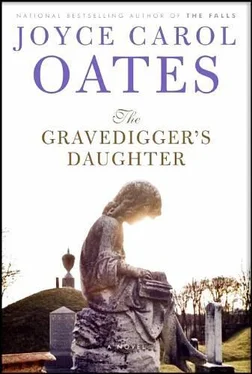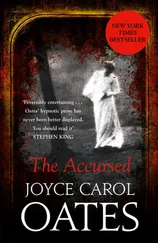After his death those misshapen work shoes would have to be cut off his feet, as if like hooves they were merged with the man’s very flesh.
There were no longer meals in the stone cottage, only just isolated and often ravenous episodes of eating. Often the food was devoured out of the heavy iron frying pan that remained more or less continuously on the stove, so coated and encrusted with grease it did not need ever to be cleaned. There was also oatmeal, in a pot on the stove that was never cleaned. There was always bread, hunks and crusts of bread, and there were Ritz crackers, eaten in handfuls; there were canned goods-peas, corn, beets, sauerkraut, kidney beans and baked beans hungrily spooned out of the cans. From a neighboring farm dairy there were fresh eggs, which were prepared swimming with grease in the frying pan; and there was fresh milk, in bottles, kept in the icebox close beside the slow-melting block of ice, for Jacob Schwart did believe in milk for children (“So that your bones will not bend and break, like mine”). When he was sober, he had a taste for milk himself, which he drank directly from the bottle as he might drink ale, gulping thirstily, without seeming to savor or even to taste what he drank, head thrown back and feet apart in a classic drinking stance. He had begun to chew tobacco and so the milk often tasted of tobacco-tinged saliva, after he’d been drinking it.
Rebecca drank this milk, gagging. Most days she was so hungry, she had no choice.
In time, Anna Schwart would emerge from her sickbed and resume, to a limited degree, her duties as housewife and mother. In time, with the catastrophe of Pearl Harbor on December 7, 1941, and the long-awaited United States declaration of war against the Axis powers, Jacob Schwart would resume some of his old embittered energy.
“In animal life the weak are quickly disposed of. So you must hide your weakness, Rebecca.”
Yes, Pa.
“When those others ask where you are from, whose people are your people, you must tell them ”The Yoo Ess. I was born here.“”
Yes, Pa.
“Why this world is a shit-hole, eh! Ask Him who casts the dice! Not one who is no more than dice. No more than a shadow passing over the face of the deep.” His scarred-scabby hand cupped to his ear in an exaggerated gesture, he laughed. “Hear? Eh? A whirring of wings? ”The owl of Minerva soaring at dusk.“”
Bleakly she smiled, yes Pa. Yes.
She would wonder: was there an owl? In the tall trees, yes there were screech owls sometimes, in the night: that high-pitched eerie cry of rapidly descending notes, that meant a screech owl. What “Minerva” was, she had no idea.
Pa’s breath, too, that stank of alcohol and something dank and sweetly rotted made her gag. His dirt-stiffened clothing, his unwashed body. His oily hair, unkempt whiskers. Yet she could not run from him. She dared not run from him. For of his children she, the little one , the unwanted one, was coming to be Jacob Schwart’s favorite. His sons had disappointed him, often he could not bear to look at them. Herschel was sullen and slovenly and resentful of working with his father in the cemetery, for no pay; Gus was growing into a skinny boy with spider-arms and-legs and a perpetual squint, as if fearing a blow out of nowhere. (When his mother disappeared into the bedroom Gus ceased speaking of her and, weeks later, when she reappeared, he averted his eyes from her as if the very sight of Anna Schwart’s raddled girl’s face was distressing to him, shameful.)
And so, those evenings Pa turned to her, the little one , taking her hands and pulling her to him, laughing, teasing, whispering to her of such strange fanciful things she could not comprehend, how should she resist, how should she run from him, oh she could not!
And there was Ma, who would seem never to change. For the remainder of Rebecca’s childhood she would seem never to change.
Though since her mysterious protracted illness she was ever more withdrawn from her family. Her sons, gangling clumsy boys, she scarcely seemed to see, and they, in turn, were acutely conscious of her, and embarrassed by her in that way of adolescent boys for whom the physical, sexual being is predominant. For Anna Schwart’s body was so fleshy, straining against the fabric of her housedresses; her breasts were so lavish, bignippled, and fallen; her stomach bloated, her varicose-veined legs and ankles swollen-how could her sons tear their eyes from her? Perversely, her face remained relatively youthful, her skin flushed and rosy as if with fever. Though Ma was morbidly self-conscious and fearful of being spied upon yet, to her sons’ dismay, she seemed oblivious of how she looked hanging laundry on the clothesline in wind that outlined her back, buttocks, thighs through her carelessly fastened clothes. In an agony of shame they saw their mother, invariably outside when funeral processions passed by the stone cottage, so very slowly. Herschel complained that Ma’s tits were like damn cow udders hangin‘ down, why didn’t she get a braz-zir like women do, fix herself up right? and Gus protested Ma couldn’t help it, her nerves, Herschel should know that. And Herschel said shit I know it! I know it but that don’t help none.
Rebecca was less keenly aware of her mother’s appearance. For Anna Schwart so fascinated her, alarmed and worried her, Rebecca scarcely knew what she looked like in others’ eyes. Rebecca felt the distance between them, even in the cramped rooms of the stone cottage. How even at mealtimes, even as she served them food, Ma’s damp heated face was vacant, preoccupied; her eyes were vague and dreamy as if, inside her head, she heard voices no one else could hear, of infinitely more interest than the crude, quarrelsome voices of her family. At such times Rebecca felt a pang of loss, and of jealousy. Almost, she hated her mother for abandoning her to the others. Her father, her brothers! When it was her mother she wanted.
For Rebecca no longer had a sister. Even in dreams she had lost Freyda. With childish logic she blamed Anna Schwart for this loss. What right had the woman to speak of my little nieces, nephew, your little cousins ! What right to show them those photographs, and now to turn away aloof and oblivious!
Especially Rebecca resented her mother talking to herself. Why could Ma not talk to her , instead of these others? Ghost-figures they were, making Anna Schwart smile in a way her living family could no longer make her smile. In the back rooms Rebecca heard her mother murmuring, laughing sadly, sighing. Dropping an armload of wood into the stove, noisily pumping water out of the hand pump at the sink, running the carpet sweeper repeatedly over the frayed carpets, Anna Schwart talked to herself in a bright murmurous voice like water rippling over rock. She is speaking with the dead Rebecca came to realize. She is speaking with her family left behind in Germany .
One winter day when the men returned home, it was to discover that Ma had removed the curtains from all the windows. The very curtains she’d sewed with such excitement, back in July. In the kitchen there had been daffodil-colored ruffled curtains, in the parlor pale rose gauzy panels, floral print curtains elsewhere.
Why?-because it was time, Ma said.
Asked what the hell that meant, Ma said imperturbably that it was time to take the curtains down because she would be using them for rags and a rag should not be dusty because a rag would be used for dusting.
Into the rag-bag in the closet, that bulged with Anna Schwart’s spoils! Jacob Schwart joked to his children that one day he would wind up in their mother’s rag-bag, bones picked clean.
Herschel and Gus laughed, uneasily. Rebecca bit her thumbnail until it bled seeing how her mother stared smiling at the floor, silent.
Читать дальше












